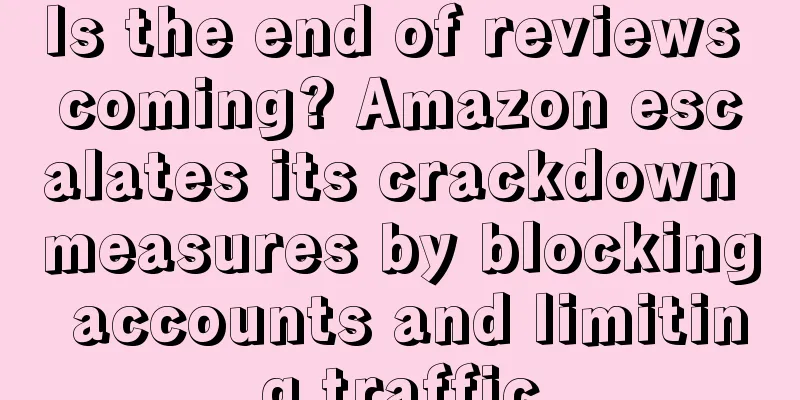The cross-border industry has been in turmoil recently. The controversy over the ban on the sale of Paton's brand Mpow has not yet subsided, and the ban on another Shenzhen-based leading seller has caused an earthquake in the industry. Many people pointed to illegal evaluations as the cause. In this turmoil, another bombshell exploded: the evaluation database of more than 200,000 people was leaked, which may affect 75,000 Amazon accounts.
Best sellers are blocked one after another, maybe it’s due to the reviews? On the eve of May Day , Paton's main account was heavily fined by Amazon for false orders, and its brand Mpow was banned from sale. While its account has not yet returned to normal, the news that a heavyweight seller in Shenzhen was blocked exploded like a thunder on the platform. For a time, everyone in the cross-border circle was in danger, fearing that they would be affected by it.
It is sad that the former big sellers have been blocked one after another, and there are many different opinions on the reasons. Some sellers speculate that this incident is likely related to a company responsible for fake orders. Due to the company's weak security awareness, its ElasticSearch data was exposed on the public Internet, allowing hackers to take advantage of it. ▲ The picture comes from Zhiwubuyan
It is reported that the incident has a huge social impact, and many mainstream American media have reported it, and public opinion continues to ferment. Therefore, Amazon attaches great importance to this and severely cracks down on fake orders and reviews. Almost all companies that have used fake orders may be affected, and a large number of companies may face flagging or closing stores. Once a seller is identified as a pay reviewer, all previous reviews will be affected. If other review-brushing companies, even if they are not involved in data leaks, may also be marked as fake orders through the above methods, causing the company to be flagged or closed. According to the seller's speculation, the previous incident of Mpow forcing positive reviews had become the fuse, and this database leak incident was tantamount to adding fuel to the fire. More than 200,000 people participated in the fake evaluation agency exposed It turns out that the seller's speculation was not groundless. It is learned that the foreign network security research organization Safety Detectives recently discovered an open ElasticSearch database, which stores more than 13 million pieces of information (7GB of data packets) between Amazon sellers and consumers who are willing to provide false reviews in exchange for free products.
▲ The picture comes from Zhiwubuyan
According to incomplete statistics, the database involves approximately 200,000 to 250,000 buyers and sellers. The leaked private information includes user names, email addresses, server addresses, PayPal account details, WhatsApp and Telegram numbers, and profile links. ▲ The picture comes from the Internet The investigation revealed the fake review tactics of the offending organization, where the seller first provides customers with a link to a product that they hope to receive a five-star review from, and the customer purchases it, posts a positive review a few days after the transaction is completed, and sends the seller PayPal account details. ▲ The picture comes from the Internet It is reported that all transactions between buyers and sellers are executed through PayPal, which can effectively avoid the risk of being detected by Amazon. In addition, sellers also have professional CRM software to manage different platforms for contacting customers, and the information is stored on the ElasticSearch server. It is understood that the server address seems to point to China, but its impact ranges all over the world. It contains information of 75,000 Amazon accounts. All accounts involved will be banned for violating Amazon's terms of service. ▲ The picture comes from the Internet Amazon has always strictly controlled fake reviews, and once found, it would either issue a warning or permanently block the account. The exposure of this large-scale fake review agency has caused an uproar. Under the dual pressure of public opinion and relevant departments, many sellers speculated that Amazon would conduct a large-scale sweep of accounts and implement more stringent measures, and both large and small sellers might be involved. The punishment method for manipulating reviews has changed again, and stores may face traffic restrictions It is reported that Amazon has taken drastic measures to rectify the behavior of manipulating reviews. Recently, a seller reported that he received a warning email from Amazon. The email stated that because the seller was suspected of illegally manipulating reviews, the listing access channel will be restricted to reduce the frequency of sellers seeing the link.
▲ The picture comes from Zhiwubuyan This means that the seller’s link will be downgraded and the entire store will be restricted. To the seller’s shock, Amazon began to adhere to the principle of “better to kill a thousand by mistake than to let one go” and sent warning emails to all accounts that copied the corresponding ASIN, and accounts that had not conducted reviews were not spared. Many sellers complained bitterly about this. Some sellers said that the punishment method might be inspired by Tmall's privacy demotion, which is a serious blow to the store. Some sellers also said that they should not have the fluke mentality to fake orders in the future, and can only rely on advertising to compete. ▲ The picture comes from Zhiwubuyan
Several leading sellers were banned one after another, and then fake review agencies were exposed. Faced with such continuous turmoil, Amazon's future regulatory measures are bound to become increasingly stringent. With this as a lesson, sellers still need to abide by the platform rules and not step into the review forbidden zone with a fluke mentality. What do you think about the recent controversy caused by the reviews? Feel free to leave a comment in the comments section~
|










